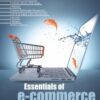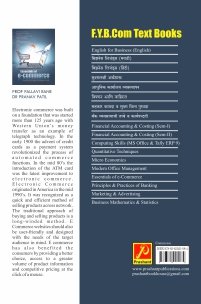Essentials of e-commerce
Authors:
ISBN:
Rs.260.00
- DESCRIPTION
- INDEX
Electronic commerce was built on a foundation that was started more than 125 years ago with Western Union’s money transfer as an example of telegraph technology. In the early 1900 the advent of credit cards as a payment system revolutionized the process of automated commerce functions. In the mid 80’s the introduction of the ATM card was the latest improvement to electronic commerce. Electronic Commerce originated in America in the mid 1990’s. It was recognized as a quick and efficient method of selling products across network.
The traditional approach of buying and selling products is a long-winded method. E Commerce websites should also be user-friendly and designed with the needs of the target audience in mind. E commerce has also benefited the consumers by providing a better choice, access to a greater volume of product information and competitive pricing at the click of a mouse.
Part – I
- Fundamentals of e-Commerce : e-Commerce: Meaning & Nature, Introduction to e-Commerce – Origin, Definitions & Meaning, Scope & Goals, Feature, Needs &Functions, Significance, Advantages & Disadvantages of e-commerce, Essentials of e-Commerce, e-Commerce v/s Traditional Commerce, Technology Infrastructure for e-Commerce -The Internet and WWW, e-Commerce Infrastructure.
- Business Models for e-Commerce : e-Business: Meaning, Definitions, Importance Requirements of E-Business, e-Business Models based on the relationships of transaction parties, Classification of e-commerce-B2C, B2B, C2C, C2G, G2G, B2G, e-Business Models based on the relationships of transaction types, Manufacture Model, Advertising Model, Value Chain Model, Brokerage Model.
- e-Enterprise : Managing the e-Enterprise, Introduction e-Enterprise, Auctions in E-commerce, Comparison between Conventional Design and E-organization, Organization of Business in an e-Enterprise, Government’s support for cashless payments- Lucky Grahak Yojna for customers and Digi Dhan Vyapar Yojna.
- e-Payment Systems and Digital Payments (Cashless Payments) : Models of Payments: Credit Cards, Debit Cards, Internet Banking, e-Credit Accounts & e-Money/Cash, e-wallets, Digital Payment System- Introduction, Advantages, Mobile Wallets, Bank Pre-Paid Cards, Point of Sale Machines, Micro ATM’s ,Unified Payment Interface, Aadhar Enabled Payment System(AEPS), Digital Signatures – Legal positions of Digital Signatures, Procedure & working of Digital Signature technology, Risks and e-Payment System – Data Protections, risk from mistakes and disputes, Consumer protection, Management Information Privacy, Managing Credit Risk.
- e-Business Communication : Introduction, Importance of e-Technology in the e-Business Communication, Models of e-Business Communication, 5.4 e-commerce Sales Life Cycle (ESLC) Model, e-Business Conferencing – Audio, Documents & Telephone, Video Conferencing, e-mail in e-Commerce, Mobile Communication.
- Customer–effective Web design : E-commerce players and procedures in India – Introduction, Requirements of Intelligent Websites, Website Goals and Objectives, Analyzing website structure, Fixed versus flexible webpage design, Choosing a page size -website development tools.
Part – II
- e-Banking : Introduction, Concepts & Meaning, Electronic Fund Transfer-Automated Clearing House, Automated ledger posting, Electronic Money, e-cheques, ATM, FOS & Tele-banking.
- Customer Relationship Management : Introduction & Definition, Consumer Market, Electronic CRMC, Need for Electronic CRM, CRM Areas : CRM Components & CRM Architecture, Electronic CRM Applications, Consumer Demographics.
- e-Security : Security Concepts: Need & Importance, Intruders, Filters: Meaning & types, Definition of fire walls, Cryptology: encryption & decryption, Attacking methods: Hacking, Cracking, Freaking, Data encryption Standards, Cyber Crimes, e-Commerce Security Solutions- e-Locking Techniques, e-Locking Products, e-Locking Services.
- e-Markets : Online Shopping and purchasing, Challenges of Traditional Marketing, Electronic Markets, Three Models of e-Markets, e-Advertising, E-Branding, Mobile Commerce, Internet Marketing Techniques.
- E-Supply Chain Management (E-SCM) : Introduction to E-SCM, Meaning E-SCM (E-Supply Chain Management), E-SCM (E-Supply Chain Management) Vs Traditional SCM (Supply Chain Management), Components of E-SCM (E-Supply Chain Management).
- Mobile Commerce : Introduction and Growth of Mobile Commerce, Mobile Health Services, Mobile Payments-Introduction, Applications & types of Mobile Payments, Wireless Applications, Technologies for Mobile Commerce, Components of Mobile Commerce.
Author
Related products
व्यवहार कौशल्ये
Rs.195.00संघटनात्मक कौशल्य विकास
Rs.145.00व्यवहारिक कौशल्ये विकास
Rs.135.00








